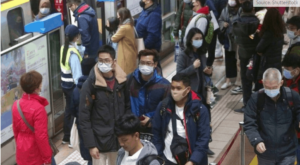Fra ABN Amro:
Putin is fully expected to win the election…
On 6 December 2017, Russia’s President Vladimir Putin announced that he would be seeking re-election in the 18 March 2018 presidential election. The result appears to be a foregone conclusion due to his enduring popularity, the lack of viable alternatives and the fact that the Kremlin may be expected to use all means at its disposal to influence the
outcome in Putin’s favour. One example is the barring of prominent opposition figure
Alexei Navalny from contending due to a suspended court conviction that some claim was
politically motivated.
The remaining opposition candidates are either tacitly supported by the Kremlin (such as Ksenia Sobchak, the daughter of Putin’s former mentor), or longstanding politicians without a strong platform or public appeal. …but the Kremlin remains concerned
In the absence of any meaningful competition, Putin is effectively running against himself. More than an electoral contest, this election is therefore widely perceived by political analysts as a referendum on public support for the president. The government has therefore sought to generate high voter turnout; the official Kremlin goal is ensuring that Putin gains 70% of the votes with a turnout of at least 70% (the so-called 70/70 goal).
High voter participation would reinforce Putin’s legitimacy and weaken the hand of opposition figures and protest activity. Yet polls suggest that Putin may struggle to attain these thresholds. Although he remains genuinely popular and many Russians continue to support the president in the absence of a better alternative, voters have become indifferent to elections due to the absence of any genuine contest. The very low turnout (below 50%) at recent legislative and state elections underlines this trend.
Putin will most likely win the elections, but a low turnout may impact the legitimacy of Putin’s government
Large-scale protests and arrests of protesters by the government may have a destabilizing impact on the market
Putin will remain focused on macro stability and fiscal consolidation
No momentum for structural reforms or privatization
Potential transition of power in 2024 will increasingly lead to Kremlin infighting in the coming years
Protests may lead to market disruptions…
Russia witnessed some of the most prolonged and large protests since the end of the Soviet Union after reports surfaced of electoral fraud by the ruling United Russia party in the December 2011 legislative and March 2012 presidential elections. We expect that small-scale protests calling for an election boycott will persist over the coming days and
could intensify following Putin’s re-election.
The outcome of the 2012 elections, in the first instance, had a positive effect on markets (yield of Eurobonds and the Russian stock market rose), however, the arrest of 500 protesters triggered a significant downward correction the stock market. In other words, negative disruptions on the financial market are rather triggered by protests and the government’s reaction to these protests than by the Presidential elections outcome.
…but discontent over structural issues could present an enduring challenge
A more pressing concern for the Kremlin is the emergence of protests in reaction to systemic problems, which are likely to be more protracted than temporary event-related protests (as illustrated by protest data above). Sizable protests broke out in several hundred cities across Russia in June 2017. A primary driver was growing discontent with
corruption and self-enrichment by the elite. But socioeconomic factors also play a role.
While the economy is recovering on the back of higher oil prices, real disposable income growth has been negative since 2014 (despite low inflation in 2017). Furthermore, Russia scores low on quality of life indicators. For example, life expectancy for men is 66, while the average life expectancy in Europe (including Eastern Europe and the Balkans) is 75. While concerning due to their structural nature, the broad range of issues also underlines just how fragmented the opposition is. These protests will not, however, have a significant impact on government stability while Putin remains in office, particularly as voters are apathetic and currently see no viable alternatives to his rule.
With Putin’s presidency secured, we see no big policy changes ahead
Given the certain continuation of Putin’s presidency and in the absence of major market disruptions surrounding the elections, we expect the Russian economy to further recover in 2018. In the second half of 2017, growth accelerated on the back of higher oil prices. For 2017 as a whole, growth increased by 1.8%, an acceleration after the negative growth in 2015-16, and we expect it to increase to 2% in 2018.
With higher oil prices, positive growth prospects, another six-year term for President Putin and no additional painful sanctions expected in the foreseeable future, we believe the government will use this momentum to cement macroeconomic stability. In addition, it will build fiscal buffers and opt for further fiscal consolidation in order to withstand future economic shocks.
Stability and fiscal consolidation have been at the core of Putin’s economic policy Over the past years, Putin has put a lot of effort into lowering inflation and ensuring government finances are in good shape. He largely succeeded, as inflation fell to 2.5% in 2018 (year-end), which is under the central bank’s target of 4%. Meanwhile, the budget remained largely in check.
Public debt is low at 12% of GDP. In light of these improvements, S&P upgraded Russia from junk to investment grade at the end of February on the back of its improving macroeconomic stability. Fitch had already assigned Russia a BBB- (investment grade) rating. Moody’s still rates the country junk, but with a positive outlook, and will likely upgrade Russia later this year.










